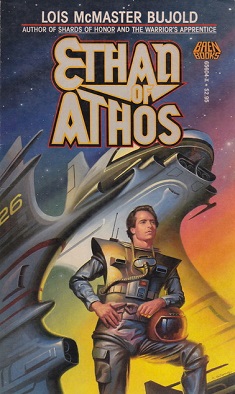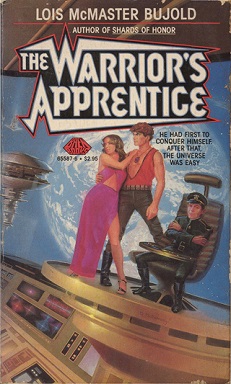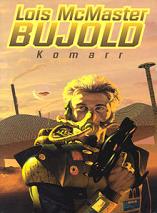In ada, “a journal of gender, new media & technology”, Lucy Baker looks at how Lois McMaster Bujold treats the birthing process in her Vorkosigan series and how it echoes real world feminist concerns:
Lois McMaster Bujold’s science fiction (SF) relies on the symbiotic relationship between the technological and the social. This is often illustrated by the tension between the scientific and medicalized process of reproduction (via uterine replicators, cloning, and genetic modification) and the primal, ‘natural’ process. Varied levels of technological advancement and associated societal changes across the myriad planets within her SF universe allow Bujold to structure this tension as an emotional and social process as much as a medical or obstetrical one, while maintaining a respect for the choices, risks, and vulnerabilities involved in becoming pregnant.
[…]
Bujold’s SF work highlights and integrates women’s experiences into the narrative. It is this examination and ultimately hopeful yet practical approach that makes Bujold’s work feminist – it is “Invention…stories and role models and possibilities, that prepare us to leap barriers and scale heights no one has reached before, that prepare us to change the world.” (Gomoll 6).
I only found this because it showed up in my referers one day, linking to my post arguing that Bujold writes hard science fiction. It’s further proof that despite her and the Vorkosigan series massive popularity, she’s still underestimated as a serious and important science fiction author. Partially it must be because the series is published by Baen Books, often somewhat unfairly dismissed as a publisher of cookie cutter mil-sf and other pulp and at first glance it’s easy to confuse the Vorkosigan books as something like the Honor Harrington series: lightweight entertainment.
That her gender also plays a part I’ll take as a given, though I note that hasn’t stopped her from winning an impressive number of Hugo and Nebula awards.
But what may also play a role is perhaps that Bujold is actually not obvious enough with her writing; as Baker argues, she writes “a covert kind of feminist SF”, nowhere near as overtly political as a Joanna Russ or even a Nicola Griffith. That the setting is the familiar sort of semi-feudal, aristocratic stellar empire helps hide this too, as the revolution the uterine replicator brings to Barrayar on the surface looks just like modernisation, not anything really revolutionary. In the same way the uterine replicator itself doesn’t look like hard science fiction because Bujold focuses too little attention to the technological side of things, but rather more on the social impact of it as filtrered through the point of view of her aristocratic protagonists.
(You could even make an argument that the overall story of the Vorkosigan series is showing the start of a bourgeois revolution, as progressive members of the old aristocracy make common cause with the up and coming rich merchants to remake the feudal system in their favour…)
And of course perhaps the most important reason why Bujold is underestimated is that she’s so very readable; you rarely have to struggle with reading her novels and we still tend to think difficulty equals genius.


